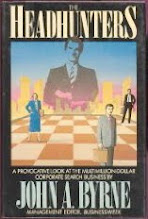If you're like me, you watched Steve Jobs' extraordinary performance yesterday introducing a new Apple product that is bound to revolutionize the way we use digital media. Even as a commonly skeptical journalist, I was deeply impressed with both Jobs and the new product, the iPad. What impact is it likely to have on traditional media?
Don't believe the folks who see this as a way for mainstream publishers to get rid of their highest costs and produce content at a profit. Some analysts are contending that the iPad platform enables newspapers and magazines to convey information in new and exciting ways. "Going forward, authors and designers will move away from a static presentation of information into one that is multimedia-based with video and other media content," Needham & Co. analyst Charles Wolf told the
Mercury News. Great stuff, right?
For what it's worth, I see the iPad as little more than another nail in the coffin for print media. Why? Unless traditional media begins to charge for its content, the iPad, the Kindle, and other e-readers make it easier for users to access and conveniently read books, newspapers, and magazines at well below the costs to produce that content. When I ran BusinessWeek's online operations as editor-in-chief of BusinessWeek.com, we were among the first magazines to offer subscriptions on the Kindle. Now you'd think that was a great idea: we can charge people for our content, without incurring the high costs of production and distribution.
But for every monthly subscription BusinessWeek sold through Amazon for the Kindle, we received 75 cents--about 15% of the $4.95 cost of a single copy on the newsstand or a tiny fraction of the $49.99 price BW is asking on its website today for a year's subscription. That's right. A monthly subscription to a weekly magazine on the Kindle returned less than a buck to our company--far below our costs to report, write, edit, art, and design the contents of the magazine. Amazon sells a BusinessWeek subscription via Kindle for all of $2.49 a month, a rate that is profitable to Amazon but pretty much a disaster for a traditional media publisher. Though Apple has yet to create contracts with traditional publishers for the iPad, you can expect more of the same.
The obvious question is why would a publisher agree to such a low return? Most enter into these deals under the assumption that something is better than nothing. They also succumb to the pressure of agreeing to unprofitable deals to show others that they are "with it." Who wants to be left behind? If your key competitors are buckling under the pressure to give away their content for a pittance, you're likely to do the same.




